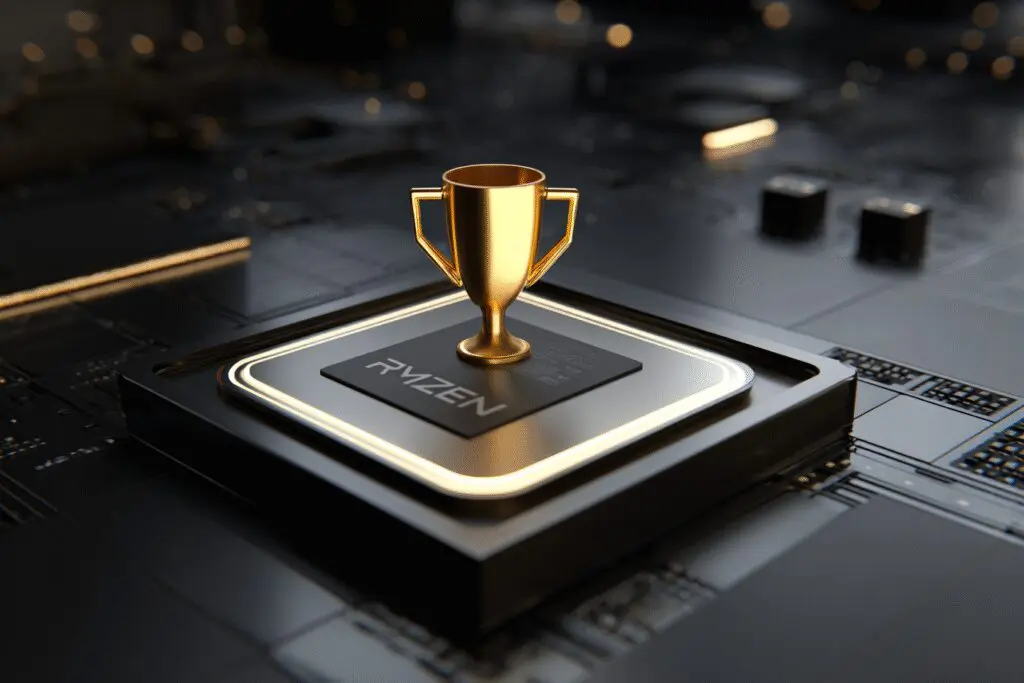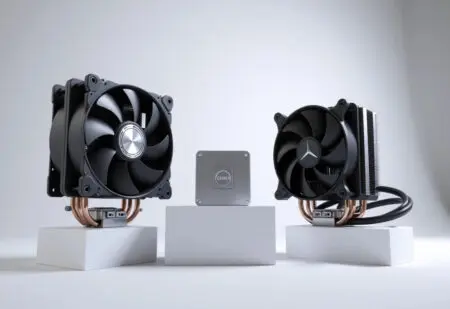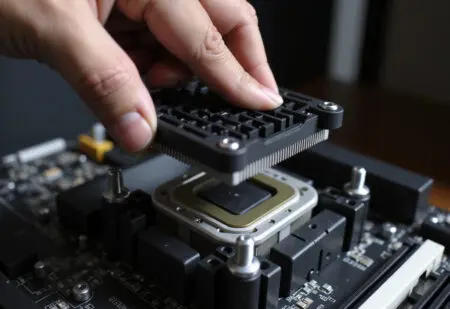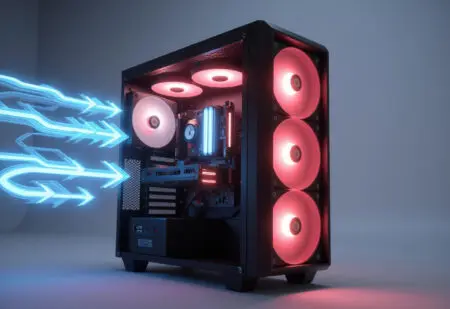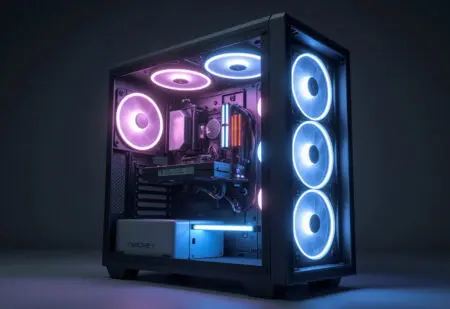Did you know that for years, the number of cores in a gaming CPU barely mattered? We were stuck in a world where four cores were plenty. Then, everything changed. When I was finally ready to upgrade my old rig, I spent weeks agonizing over every component. The central processing unit, the CPU, was the heart of the build, and the decision felt monumental. That’s when I landed on the AMD Ryzen 7 5800X. So, to answer the question you’re asking right now: is Ryzen 7 5800X good for gaming? Absolutely, and it’s not just “good”—for a huge number of gamers, it remains a phenomenal choice, even with newer chips on the market.
This processor represents a sweet spot. It’s a point where performance, price, and platform maturity come together to create one of the most compelling gaming CPUs ever made. However, simply saying it’s good isn’t enough. You need to know why it’s good, who it’s for, and if it’s the right brain for your gaming machine in today’s landscape. Let’s dive deep into what makes this chip tick and whether it should be at the top of your list.
More in CPUs & Processors Category
What Is the Best CPU for Gaming
What Exactly is the AMD Ryzen 7 5800X?
At its core, the Ryzen 7 5800X is an 8-core, 16-thread processor built on AMD’s highly successful “Zen 3” architecture. When this architecture was first released, it was a genuine game-changer. It delivered a massive leap in single-core performance over previous generations, which is incredibly important for gaming.
Think of it like this: many games, especially older ones, can’t effectively use a ton of cores at once. Consequently, they rely heavily on the raw speed of a single core to process instructions quickly. Zen 3 was AMD’s definitive answer to this, delivering the speed needed to push frame rates sky-high.
I remember the moment I installed mine. Coming from an older 4-core CPU, the difference wasn’t just on paper; it was immediately noticeable. The entire system felt snappier, but the real magic happened when I launched a CPU-intensive game. Those moments where the action got heavy and my old chip would stutter were suddenly smooth as butter.
Key Specifications at a Glance
To understand the 5800X, it helps to see its stats. But don’t worry, we’ll translate what these numbers actually mean for your gaming experience.
- Cores/Threads: 8 Cores / 16 Threads
- Base Clock Speed: 3.8GHz
- Max Boost Clock Speed: Up to 4.7GHz
- Total L3 Cache: 32MB
- Platform: AM4 Socket
- Default TDP (Thermal Design Power): 105W
The 8 cores and 16 threads provide a fantastic foundation not just for today’s games, but for multitasking as well. If you’re the kind of person who likes to have Discord, a web browser, and maybe even a music app running in the background while you play, this CPU won’t even break a sweat.
How Does the Ryzen 7 5800X Perform in Modern Games?
This is the real question, isn’t it? Benchmarks and specs are one thing, but how does it actually feel when you’re in the middle of a firefight in Apex Legends or exploring the vast world of Cyberpunk 2077?
Simply put, the Ryzen 7 5800X delivers a high-end gaming experience. It’s powerful enough to feed even top-tier graphics cards, like an NVIDIA GeForce RTX 3080 or even an RTX 4070, without causing a significant bottleneck in most situations.
I paired mine with an RTX 3070, and it was a match made in heaven for 1440p gaming. In graphically demanding titles, the GPU is usually the limiting factor, but the 5800X consistently provides it with all the data it needs to render frames quickly. This results in high, stable frame rates and a much more fluid and responsive experience.
What About Performance at Different Resolutions?
The resolution you play at significantly impacts where the performance load falls. The 5800X shines across the board, but its role changes depending on your monitor.
- 1080p Gaming: At 1080p, the CPU’s job is arguably the most critical. The graphics card can render frames so quickly that it’s often waiting on the CPU to get the next one ready. The 5800X’s fantastic single-core speed makes it an absolute monster for high-refresh-rate 1080p gaming. If you’re an esports player with a 240Hz or even 360Hz monitor, this chip will help you squeeze out every possible frame.
- 1440p Gaming: This is often considered the sweet spot for modern PC gaming, and it’s where the 5800X truly feels at home. It has more than enough power to keep up with demanding GPUs, ensuring a smooth and consistent experience without being overkill. You get beautiful visuals without sacrificing the high frame rates that make gameplay feel responsive.
- 4K Gaming: At 4K, the performance bottleneck almost entirely shifts to the graphics card. The GPU is working so hard to render the massive number of pixels that the CPU has plenty of time to prepare frames. In this scenario, the 5800X is more than capable. You won’t see a huge difference between it and a much more expensive, newer CPU at 4K because the GPU is the star of the show.
Does the Zen 3 Architecture Still Hold Up Today?
One of the biggest questions when buying a slightly older piece of tech is its longevity. Is the Zen 3 architecture still relevant? Yes, absolutely.
The key to Zen 3’s success was its redesigned core complex (CCX). In previous generations, AMD CPUs with 8 cores had them split into two separate 4-core groups, and communication between them had a slight delay (latency). With Zen 3, all 8 cores can directly access a large, unified 32MB L3 cache.
This might sound overly technical, but the impact on gaming is huge. Cache is super-fast memory right on the CPU die. Having a large, unified pool of it means the CPU doesn’t have to reach out to your main system RAM as often, which is much slower. I was curious about the fundamental principles of CPU architecture and found a fantastic overview of RISC processors on Stanford University’s Computer Science page that helps explain why these design choices are so critical. This design significantly reduces latency, boosting performance in latency-sensitive applications like games.
Is an 8-Core CPU Enough for the Future?
For the foreseeable future of gaming, 8 cores is more than enough. While we are seeing newer games utilize more cores better, the primary performance driver remains single-threaded speed. The 8 cores and 16 threads of the 5800X give you a ton of headroom for background tasks and for future games that might become more demanding. It’s a comfortable place to be, ensuring your system remains capable for years to come.
What Do You Need to Build Around a Ryzen 7 5800X?
A CPU doesn’t exist in a vacuum. The components you surround it with are just as important. Fortunately, one of the biggest advantages of choosing the 5800X today is the value and maturity of its platform: AM4.
Why is the AM4 Platform Such a Big Deal?
The AM4 socket has been around since the first generation of Ryzen. This has several massive benefits for builders today:
- Affordable Motherboards: You have a vast selection of high-quality B550 and X570 motherboards available at very competitive prices. I went with a B550 board for my build and have never felt like I was missing out on any essential features. It offered PCIe 4.0 for my GPU and NVMe SSD, which was all I needed.
- DDR4 RAM is a Bargain: The 5800X uses DDR4 memory, which is significantly cheaper than the DDR5 memory required by newer platforms. You can get a fast 32GB kit of DDR4 for a fraction of the cost of a similar DDR5 kit, allowing you to allocate more of your budget to a better graphics card.
- Proven Stability: The AM4 platform has had years of BIOS updates and refinements. It’s rock-solid and stable. You can build your system with confidence, knowing that the components are well-tested and reliable.
How Important is Cooling for the Ryzen 7 5800X?
This is one area where you can’t afford to cut corners. The Ryzen 7 5800X has a reputation for running a bit hot. Its 105W TDP means it can generate a fair amount of heat, especially when all cores are working hard.
The chip is designed to boost its clock speeds as high as possible, for as long as possible, provided it has enough power and thermal headroom. This is great for performance, but it means a stock cooler just won’t cut it (and it doesn’t come with one anyway).
You should budget for a quality cooling solution. This doesn’t mean you need a super-expensive custom water loop.
- High-End Air Coolers: A quality tower air cooler from a brand like Noctua, be quiet!, or Scythe is more than capable of taming the 5800X. I personally use a dual-tower air cooler, and my temperatures are excellent, even during long gaming sessions.
- AIO Liquid Coolers: A 240mm or 280mm All-In-One (AIO) liquid cooler is also a fantastic option. It can offer slightly better peak performance and can look cleaner in some builds, but it comes at a higher cost.
Proper cooling is not just about preventing overheating; it’s about maximizing performance. A cooler 5800X will maintain its high boost clocks for longer, giving you better, more consistent frame rates.
How Does It Compare to the Competition?
When you’re shopping for a CPU, it’s always wise to see what else is out there. How does the 5800X stack up against other popular chips?
Ryzen 7 5800X vs. Intel Core i5-12600K/13600K
Intel’s 12th and 13th generation Core i5 processors are formidable competitors. In pure gaming performance, a chip like the 13600K will often pull slightly ahead of the 5800X. However, the story isn’t that simple.
Building an Intel system typically requires a more expensive motherboard and, for the 13th gen, a stronger case for more expensive DDR5 RAM to get the most out of it. When you look at the total platform cost—CPU, motherboard, and RAM—the Ryzen 7 5800X on the AM4 platform often comes out as the better value proposition, delivering 95% of the performance for a much lower entry price.
Ryzen 7 5800X vs. Ryzen 7 7700X
What about its successor on the new AM5 platform? The Ryzen 7 7700X is undeniably faster. But it requires a new, more expensive AM5 motherboard and mandatory, pricey DDR5 RAM. The initial investment is significantly higher.
For someone building a brand new, top-of-the-line PC from scratch with a large budget, going with AM5 makes sense for future-proofing. However, for anyone looking for the absolute best performance for their dollar right now, the 5800X and the AM4 platform offer a nearly unbeatable combination. The money you save can be put towards a more powerful GPU, which will result in a far bigger real-world gaming performance increase.
Is the Ryzen 7 5800X Still a Good Buy Today? The Final Verdict
So, let’s bring it all together. After countless hours of gaming, tinkering, and just using my PC for daily tasks, my personal verdict is a resounding yes. The Ryzen 7 5800X is still an excellent CPU for gaming.
It hits a perfect balance. It’s powerful enough to handle any game you throw at it and any modern graphics card you pair it with. Moreover, it’s efficient enough that you don’t need an exotic cooling solution. Most importantly, the value offered by the mature and affordable AM4 platform is simply too good to ignore.
You get a CPU that delivers a truly high-end gaming experience, and you save money on the motherboard and RAM, which can then be invested in the one component that matters most for gaming: the graphics card. It’s a smart, powerful, and cost-effective choice that will keep you happily gaming for many years to come. If you’re building a new PC or looking for a meaningful upgrade on the AM4 platform, the Ryzen 7 5800X should be at the very top of your consideration list. It’s a modern classic for a reason.
Frequently Asked Questions – Is Ryzen 7 5800X Good for Gaming

Who should consider buying the Ryzen 7 5800X today?
The 5800X is ideal for upgrading old AMD systems with AM4 motherboards via BIOS updates, and also for building a budget-friendly new gaming PC by balancing its lower cost with a high-performance GPU. It is especially suitable for gamers seeking strong performance without spending too much.
Why is the Ryzen 7 5800X considered a good value in 2025?
The 5800X is a great value because the AM4 platform is older and less expensive, allowing for a cheaper motherboard and DDR4 RAM. This cost saving enables gamers to invest more in a powerful GPU, offering better overall gaming performance for the money.
Is the Ryzen 7 5800X a good choice for gaming at high resolutions such as 1080p, 1440p, and 4K?
Yes, at 1080p, the 5800X handles most games efficiently, especially with high-refresh-rate monitors. At 1440p, the GPU becomes the main limiter, making the CPU less critical. For 4K gaming, the GPU is the primary factor, and the 5800X remains more than capable at this resolution.
How well does the Ryzen 7 5800X perform in modern gaming scenarios?
The Ryzen 7 5800X performs very well in current games owing to its 8 fast cores. It provides high frame rates and avoids bottlenecks when paired with powerful GPUs, ensuring smooth gameplay even with new, demanding titles.
What is the AMD Ryzen 7 5800X and what are its main features?
The AMD Ryzen 7 5800X is a desktop CPU from the Zen 3 family, compatible with AM4 motherboards. It features 8 cores and 16 threads, with a base clock speed of 3.8 GHz that can boost up to 4.7 GHz, making it well-suited for gaming and multitasking. It supports platforms like B450, B550, and X570.

